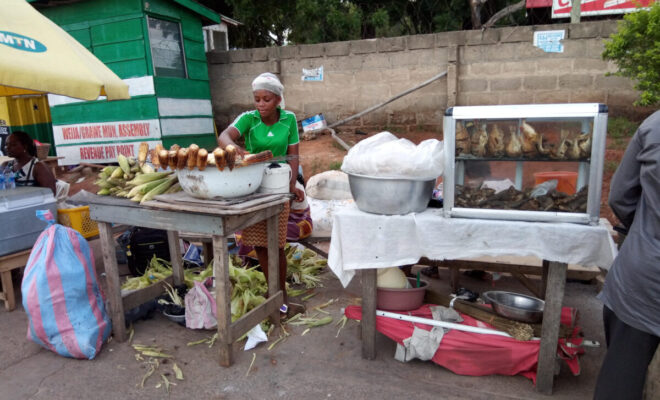Chief Executive of the Accra Metropolitan Assembly (AMA), Elizabeth Naa Kwatsoe Tawiah Sackey, has called on Ghanaians to demand Food Handler’s Certificate from food vendors before patronising their food.
This according to her would help reduce the high incidence and consequences of foodborne diseases in the city and ensure best practices for the production and serving of wholesome food in the city.
Speaking at the launch of the Food Safety Week celebration held at the forecourt of the AMA on Monday, on the theme: “Food Safety for a Healthy Tomorrow”, Ms. Saceky pointed out that foodborne diseases caused by the consumption of unsafe foods were responsible for the deaths of thousands of people each year and stressed the need to intensify producer and consumer education to create awareness on the quality of food.
“The regulation of food safety cannot be the responsibility of one entity alone. We all have a role to play to ensure that the food we consume stays safe at every stage of the food value chain; from production to harvest, processing, storage, distribution, and all the way to preparation and consumption thereby protecting lives and enhancing economic growth,” she said.
“Food safety is when one is confident that food after preparation or production will not cause any illness or death after consumption…In Ghana today, we know that foodborne diseases caused by unsafe foods are responsible for the deaths of thousands of people each year…This is an unacceptable situation and we must all ensure that preventable food safety issues do not result in any more loss of human life,” she added.
Ms. Sackey disclosed that as part of efforts to ensure that food patronised and consumed in the city was safe, the Public Health Department of the AMA had made conscious efforts to create public awareness on the effects of unsafe food, screened food vendors, embarked on several inspections as well as enforcement exercises to ensure food safety within the Metropolis.
She also used the opportunity to pledge support to ensure continued consumption of wholesome food within the Metropolis.
Minister for Local Government and Rural Development, Dan Kwaku Botwe, in a speech, read on his behalf called for concerted efforts from all Ghanaians to ensure food safety at every stage of the food value chain.
“Food safety is a shared responsibility between government institutions, producers, and consumers… Everybody has a role to play from farm to table to ensure the food we consume is safe and will not cause damages to our health…Through the District Performance Assessment Tool (DPAT), the Ministry pursues its efforts to mainstream food safety in the public agenda and reduce the burden of foodborne diseases in the country, this we have done by including indicators on food safety in the DPAT assessment,” he said.
He stressed that the five keys to safer food guidelines were, keep clean, separate raw and cooked foods, cook food thoroughly, keep food at safe temperatures and use safe water and raw materials.
He noted that the Ministry as part of its role in implementing the Modernising Agriculture Programme had developed the food safety guidelines to guide Metropolitan, Municipal and District Assemblies (MMDAs) in the enforcement of their bylaws on food safety adding that these bylaws were meant to protect the health of consumers, ensure fair practices in the food trade, as well as provide capacity building for MMDAs to implement food safety systems.
He urged MMDAs to deepen engagement with the food providers and handlers in the food value chain and to ensure that the guidelines are disseminated and the bylaws enforced.
He assured that the Ministry would work closely with the Ministry of Health, the FDA, Ministry of Agriculture, to ensure food safety.
Mrs. Delese Mimi Darko Chief Executive of the Food and Drugs Authority (FDA), commended the Local Government Ministry for the awareness creation on food safety adding that it was one of the major means by which the general populace could be sensitised on food handling practices and basic food hygiene to empower the consumer to demand good quality and safe food.
Source: myghanamedia.com






